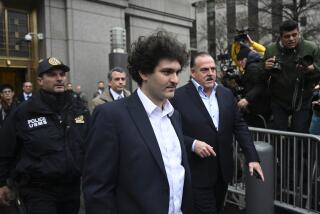Showdown Looms on Knickerbocker Stock : Trading: In a classic case of a ‘short squeeze,’ sellers scramble to recover from bets that the share price would fall.
- Share via
RANCHO SANTA MARGARITA — Trading in L.L Knickerbocker Co.’s soaring stock appeared headed for a showdown today as certain traders scrambled to recover from ill-fated bets that the share price would fall.
So-called short sellers, traders who borrow and sell shares they believe are wildly overpriced, had been betting big that shares of the Orange County maker of collectible dolls were headed for a plunge.
Now, in a classic “short squeeze,” at least one of the brokerages that had lent short sellers Knickerbocker stock to sell is demanding that they repay up to 100,000 shares--10% of the company’s available stock--by today, market sources said.
That is putting pressure on short sellers to buy the stock in the open market, which may drive the price even higher.
“I’ve never seen anything like this,” said one trader at a large investment banking firm that is attempting to cover its short position. “Just look at this stock. I think people borrowed too” many shares.
Knickerbocker, whose products are touted by celebrities such as Marie Osmond, saw its stock rocket from about $4 in mid-June to a high of $52 last week.
After a 20% drop to $37.50 on Monday, the price has rebounded, adding $1.375 to $44.375 on Wednesday in Nasdaq trading.
The trading activity is quickly becoming a textbook case of how a relatively tiny stock can be subjected to spectacular swings when it is caught in a battle between short sellers and the investors backing the shares.
In a short sale, a trader borrows stock--usually from a brokerage’s inventory--and sells it on the open market. The trader is betting that by the time the shares must be returned to the lender, the stock price will have declined, allowing the trader to buy replacement shares at a lower price.
But in Knickerbocker’s case, traders who have shorted the stock have seen the price continue to rise instead of slide. As long as the price is rising, short sellers’ potential losses grow, because they face the prospect of buying replacement shares at prices higher than where they sold.
Some market observers say that what is happening now is a classic short squeeze: The short sellers are being forced by nervous lenders to repay their stock loans. To get the shares, the short sellers must buy in the open market, putting additional upward pressure on the price and thus compounding the shorts’ losses.
Sources say brokerages that have lent Knickerbocker stock to short sellers are concerned because of the rapid increase in the stock price and the fact that traders may have borrowed as many as 500,000 to 800,000 more shares than exist--essentially shorting the same shares more than once.
It is an especially tight squeeze in the case of Knickerbocker, a thinly traded stock with only about 2.4 million shares outstanding.
“The system is being manipulated by shorts,” said Rafi M. Khan, a controversial trader and promoter of small stocks who began aggressively touting Knickerbocker in June. “They have created their own death.”
Some brokers and regulatory officials hinted Wednesday that short sellers may have illegally borrowed stock they were not authorized to borrow, in an attempt to drive the price down.
But some also questioned whether there may have been unfair touting of the firm’s financial performance, issues the Securities and Exchange Commission and the National Assn. of Securities Dealers may be examining.
Texas securities regulators confirmed Wednesday that they would not allow Knickerbocker to issue stock there in January--when the company went public--because of disclosure issues.
The regulators said they were so alarmed by the company’s original filing for its initial public offering that they raised a series of questions. Because Knickerbocker did not respond to regulators’ questions, the company wasn’t given approval to sell its initial public offering in Texas, they said.
Specifically, Texas regulators found that the company did not meet state criteria for fairness to investors and complete disclosure of the company’s financial position.
Company President Louis Knickerbocker said he was not aware of the questions Texas regulators had.
More to Read
Inside the business of entertainment
The Wide Shot brings you news, analysis and insights on everything from streaming wars to production — and what it all means for the future.
You may occasionally receive promotional content from the Los Angeles Times.










